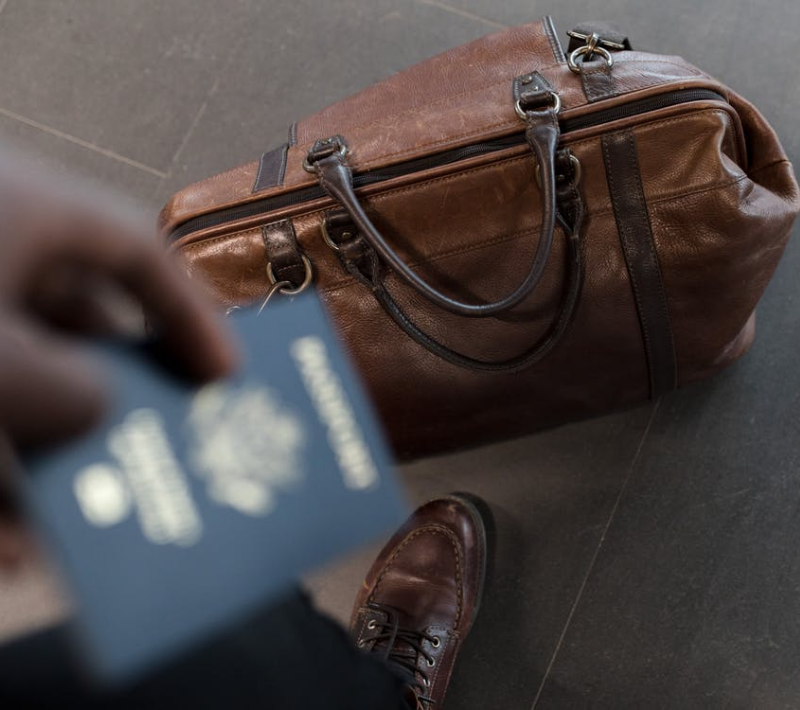Expatriate Immigration: 5 Things To Know About ‘Japa’ Season

Happy New Month fam! It feels so exciting walking into the November month for a lot of reasons. First, there’s the end-of-the-year feeling. You can feel Christmas in the air already, and you might even see discount sales on Christmas items now. Then there’s Halloween, black Friday sales, public holidays here and there, but most importantly, Japa season!
In case you’re wondering what Japa is, it just means relocation. Japa season is that period when a lot of people move to more developed countries, whether through school or by getting new jobs. As more countries around the world open their borders to skilled immigrants, this season is a great opportunity for people to migrate in search of greener pastures.
Only a year ago, Germany opened its borders to allow 400,000 skilled immigrants to settle within the country. This created quite a buzz on social media, especially for people in less developed countries.
Like Germany, many other countries have created immigration policies that allow skilled workers to settle within their territory. Despite the divergent views on immigration, expatriate immigration is a great solution for any country with an ageing population to fill the gap in its workforce.

Migration through education, career, sports, research, or manual labour means hope for many people. It presents new beginnings, a fresh start, and an upgrade from how things used to be.
But before you pack up your bags and find your way out, there are crucial areas you need to cover. You should know the legal implications of migrating to your new country. It could help you settle in faster, prevent conflict with law enforcement, or avoid deportation altogether.
5 Things To Do Before You Relocate In This Japa Season
1. Know Your Visa Requirements
This is one issue with which many immigrants seem to struggle. There are different visas for different travel purposes. If you intend to relocate to a new country, it would be ridiculous to get a Tourist visa which usually lasts for 90 days.
There are different visa categories, depending on your purpose of travel. It is better to obey your visa requirements to avoid harassment, living in fear of deportation, and eventual deportation back to your home country. Constantly running from immigration authorities means no access to basic amenities, no peace of mind, and no access to good jobs.
For many people, deportation comes eventually. Most times, they become restricted from entering that country in the future. Deportation puts a dent in your travel record. Any Consulate officer who sees evidence of deportation would have difficulties trusting you to obey visa requirements. It is not a good look and is certainly not worth all the drama it brings.
Applying for a business or student visa is a good choice for long-term travel plans. On the other hand, short-term visas allow you to test the waters. It helps you explore your new environment and build trust between yourself and the embassy. You can even apply for a long-term visa while you’re in the country. The process could be easy and you won’t have to return.
Migration can be life-threatening for people who cross borders through the desert or as a stowaway in a ship. Such people undertake such measures out of desperation, which can end badly. Before attempting any illegal form of migration, consider all the available opportunities to migrate legally.
2. Migrate Through Legal Means

One of the best ways to move to a new country is through school. Developed countries often create scholarship programs for both citizens and non-citizens to benefit from. Some programs are created for women, and some others are for black students from underprivileged communities.
Many of these programs usually require exceptional grades, but some other programs accept students with average school grades who display their gifts in other areas like academic research, technological advancement, or sports.
Countries like Canada, America, and England have work and study programs that allow students to work for a limited number of hours, such as 40 hours per week. Such programs make it easier to pay tuition, accommodation bills, and general welfare charges. Countries like the UK also allow graduate students to settle for some years. This means an immigrant can get a job and earn money after graduation before leaving. This also increases your chances of settling there permanently. However, tuition fees in these countries are usually high.
On the other hand, countries like Ukraine have much more affordable tuition but do not have work-and-study programs for students. Any attempt to get a job alongside your schooling would be illegal.
Students often turn to menial jobs just to earn a few extra bucks. They could be harassed, maltreated, or even denied pay after working because some employers see this as an opportunity to exploit their desperation. These countries do not have visa specifications that allow graduates to work after school. Therefore, before you choose your school or country, be sure you can survive the peculiarities of your visa requirement.

Another means of legal migration is through amnesty. Some countries accept refugees from war-torn areas. The USA accepted several refugees who escaped from Afghanistan after the Taliban took over. And the UK, Belgium, Poland, Romania, and other surrounding countries received refugees fleeing Ukraine after Putin attacked.
Usually, the recipient government would do what it can to help the refugees settle somewhere within the country. Human rights activists and other Individuals fleeing for their lives can apply under this category. They may be fleeing terrorists, military governments, or other dictators in power who will snuff out the voice of reason. Journalists may apply under this category as well.

Next, you can relocate through career opportunities. With job platforms like Indeed and LinkedIn, employment in today’s world has gone beyond borders. Additionally, the covid 19 virus opened up many opportunities to work remotely. It is much easier to get an international job now, as long as you have the required skill set.
While some jobs allow you to work at your own pace, others may require you to work along their schedule. It is not easy for a person living in one part of the world to keep up with the timeline in another part of the world. Therefore, some companies have relocation plans for their employees or at least visiting options for technical training.
Many countries seek skilled workers in some professions, particularly in the medical sector. After the covid19 virus ravaged the health sector globally, government authorities realized the need to equip their health sectors to handle future outbreaks. The aim is to get as many professionals as possible, especially after health workers paid the ultimate price to combat the virus in 2020.
Different countries have specific requirements for medical ex-pats to migrate. This includes language requirements, medical license exams, proof of clean criminal records, and bank account statements. You may also need to present a Certificate of Good Standing from the medical board in your home country as proof of practice.

And finally, you could relocate to a new country through marriage. This is one of the most common forms of migration. With the numerous social networks today, people across countries or continents connect easily. You just have to be very careful of fraudsters. Some immigrants also prefer to return to their countries to pick a spouse and bring them over.
Migration through marriage can be life-changing. In most cases, the spouse would already be stable. This includes a job or business, decent accommodation, and a support system. This way, the incoming spouse can adapt easier.
While countries like the USA, Nigeria, and Canada grant citizenship through marriage, this is not the case in every country. Marriage to a citizen in Ukraine or Germany will get you access to a resident visa, although, in the long run, you could become a citizen.
You should also ensure you know the person you intend to marry. Some human traffickers pose as potential spouses to lure women, only to force them into prostitution. They seize their passports, give them new identities, and inflict harm on them. These horrific tales are the sad realities of many women, and we must avoid such at all costs.
3. Have A Solid Accommodation Plan

If you have a friend or family member abroad, you may expect them to accept and accommodate you when you first arrive. But the experiences of some immigrants have been negative in this regard.
First of all, there’s the possibility of disappointment. Some people may even leave you stranded at the airport all by yourself. Some may accommodate you briefly, but they could change their minds mid-way. In some instances, travel agents claim to arrange accommodation options for their clients but fail to come through.
Regardless, you should have at least three viable accommodation options before moving to your new country. Have enough money on you when you first arrive to be on the safe side.
Being stranded in some airport somewhere is not something anyone should experience. If it ever happens, please ask for your country’s embassy and try to make your way there. It is a place where you can get help.
4. Know Your New Environment
In your home country, there are certain things you may be able to get away with undetected, and even if you get caught, you do not have to fear deportation because you are a citizen.
In this new country, be as law-abiding as possible. If you buy a car and drive, take a standard driving test to get your license. Learn about the country’s history, culture, and applicable laws.
Some countries do not allow certain kinds of dressing, while others may have gender restrictions in some sectors. You can learn more by observing your environment.
If you’re in a professional field, please learn and comply with professional ethics. If you treat certain situations with neglect, you could end up in a legal system that takes all issues seriously.
Respect personal boundaries and privacy. Do not obtain client information for illicit purposes, as this could easily backfire. In case of intimacy or any attempt at friendship, obtain clear evidence of consent. It is much easier to ruin a reputation than to build one.
Avoid conflicts as much as possible, and always remember that as a migrant, you have more at stake. Choose your battles, and prioritize your safety and peace of mind.
5. Get In Touch With A Community Of Friends And Family On The Other Side

Everyone needs a support system. While moving to a new country may be exciting, it can come with some challenges too. First, adjust to a new system with different laws, cultures, languages, food, or weather conditions.
Some people settle in comfortably after some months, but for others, it could take years. It can also get lonely if you migrate without your family or spouse.
You need to find a safe community like a church, a gathering of your co-workers, support groups for students, and so on. You could also sign up for a mentorship program around, so you have someone to motivate and inspire you from time to time. After all, we all need someone to lean on.
Conclusion
While anti-immigration activists act as though immigration is one-sided, this is far from the truth. Skilled migrants contribute immensely to the economy of recipient countries too. The requirements for expatriate immigrants allow the organization to select qualified and capable individuals that get the job done.

Revenue generated from visa application fees, examination fees, and even taxes of these skilled immigrants contributes to the growth and development of host countries.
Even though migrating to a new country can be challenging, it is often a rewarding experience. Just have all the information you need to make your transition easier and smoother.
And to everyone who isn’t migrating this season, do not hesitate to look out for some of the juicy job opportunities that open up.
All images are sourced from Unsplash, free for commercial use.
Every issue has a legal side to it, whether we realize it or not. My goal is to educate my audience about these legal issues that arise in our societies, especially as a black woman. My Legal articles bring a refreshing, fun, and objective view to trending topics across the globe. In the end, I hope you can learn or unlearn a thing or two wherever the need arises.

